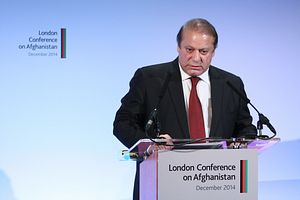Pakistan’s embattled Prime Minister Nawaz Sharif, currently under investigation over revelations from last year’s Panama Papers, has continued to reiterate this week that he won’t resign, despite a Joint Investigation Team (JIT) report finding him guilty of “glaring disparity in the assets and known income.”
Regularly calling those demanding his resignation “conspirators,” Nawaz has maintained that he has the backing of the “JIT of the masses.” This underscores as much a gruesome misunderstanding of democracy, as it highlights its fragile existence in Pakistan – a country marred by military interventions and overthrowing of civilian governments throughout its history.
With the JIT report itself not set in stone, many commentators have cited this instability as the foremost reason why the prime minister shouldn’t resign, which could supposedly damage democracy in Pakistan. They argue that the investigation into Sharif is the latest witch-hunt in a country where no prime minister has managed to complete their five-year tenure, and that it wouldn’t stop with Sharif’s resignation.
The same line of argument also suggests that the report is an outgrowth of Sharif’s standoff with the military establishment, which has seen the senior army leadership regularly aim for his ouster.
It’s an open secret that the 2014 protests in the capital, a year after the Sharif-led government’s takeover, were orchestrated by the military leadership, who pulled the strings of Pakistan Tehreek-e-Insaf (PTI) Chairman Imran Khan and Pakistan Awami Tehrik (PAT) chief Tahir-ul-Qadri.
But the suggestion that the army is going full throttle with the same objective a year before the next general elections makes little sense for two reasons.
First, it has been a while since a hard coup was removed from the army’s menu, with the senior military leadership preferring a softer version. This is especially true at a time when none of Islamabad’s foreign allies would back a military takeover, including China, which has regularly expressed its concerns about the “Pakistan Army’s Islamization.”
Second, with absolute lack of accountability over military actions in Balochistan, foreign and security policies under complete control, and ties with India as volatile as ever – usually the realms that the military wants to dictate – Nawaz Sharif’s presence in the Prime Minister’s House shouldn’t be a concern big enough for the army leadership to invest any resources in his removal.
With the army already under complete control of matters that matter the most, and a hard coup clearly off the table, would Nawaz Sharif’s resignation really do any damage to democracy in the country?
Even if one were to completely ignore the moral grounds under which any state official should step down – even if temporarily – while there’s an investigation going on against them in the apex court, Sharif’s stubbornness doesn’t make much political sense either.
In case the prime minister is disqualified by the Supreme Court, his go-to action would be to play the victim card, which hasn’t historically worked on the Punjabi populace – the vote bank that decides who gets to rule Pakistan.
The argument that Sharif’s resignation would be perceived as an admission of guilt by the voters only works if the premier actually is guilty of breaching any of the clauses that could render him illegitimate. These include lying about offshore properties, misleading the apex court with forged evidence, hiding overseas employment while running for prime minister, or simply failing to substantiate the disparity between his income and assets.
Even if you buy the idea that Sharif being “victimized” by a joint army-judiciary alliance would actually make him a popular choice next year, it fails to corroborate how a judicial disqualification – and not Sharif voluntarily stepping down – would actually strengthen democracy in Pakistan.
How does a family that is battling corruption allegations bolster democracy by refusing to allow even a temporarily nominated premier from outside the clan?
Granted, the baggage that has eroded Pakistan’s civilian institutions doesn’t allow for any genuine expectations of ruling prime ministers resigning over moral questions just yet, but there’s a difference between acquiescing to a position taken by the rulers and presenting it as principled fight.
Perhaps it might be unrealistic to expect Sharif to step down on his own. But it is that action, of presenting oneself for accountability as an elected leader of the country, that would shore up democracy and not an egotistical refusal to do the same.
The idea that only the masses should decide the fate of elected officials in the next polls not only elevates leaders beyond the law, it renders the institution of the judiciary superfluous as well. That the judiciary itself, and indeed the army, hasn’t had its representatives nearly as scrutinized doesn’t mean that giving a pass to civilian leaders’ crimes somehow translates into safeguarding democracy.
Democracy isn’t an end in itself. Often mistaken for majoritarianism, democracy in its simplest definition is a means of governance to ensure equality. Institutions, heretofore above accountability, can only be brought into the equality net if those elected by the masses start voluntarily stepping forward first.

































